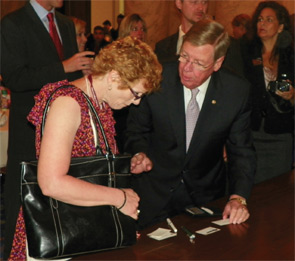
My story is all too common for patients with autoimmune disease. It starts with misdiagnosis followed by years of tests, infections, minor surgeries, and numerous visits to multiple doctors. I went from being an avid runner and aerobics instructor to having painful, red, and swollen knuckles, reoccurring fatigue, and unexplained fevers. It was five years before I was tested for an autoimmune disease, referred to a rheumatologist, and ultimately diagnosed with rheumatoid arthritis.
I want to share my story because I have learned that my experience is far from unique. As an arthritis and autoimmune disease advocate, I hear stories similar to mine every day. These stories are simply unacceptable, and I have made it my personal goal to ensure that future patients don’t have to go through the same uncertainty and delayed treatment that I went through. Lawmakers must understand the crucial nature of early and appropriate treatment for patients with arthritis and rheumatic diseases. One way to accomplish this dialogue is through attending the ACR’s Advocates for Arthritis fly-in held each September in Washington, D.C.
Advocates for Arthritis provides an opportunity for rheumatology professionals and patients to meet with legislators to not only share our stories, but to speak with them about current legislative issues involving the rheumatology community and to illustrate the impact health policies are having on physicians and patients in their districts and states.
Make a Difference
The first time I attended Advocates for Arthritis, I was a little worried and wondered, “Could I really make a difference?” But, once I got there and was surrounded by other patients with autoimmune diseases like mine—survivors and fighters just like me—who began to share their stories, along with rheumatology professionals, I realized the power that our united voices would bring to Capitol Hill.
The conference is a two-day event. The first day is spent getting to know one another, discussing the current legislative issues at hand and strategizing how we, as a team, would direct our conversations with lawmakers. The following day, our team of patient advocates and rheumatology professionals met with the congressional delegation from our state. It was a truly empowering experience. Here we were—rheumatologists ready to speak on the issues that affect their practices such as billing issues and the need to keep their clinics accessible to new patients, and patients ready to give a “show and tell” to the lawmakers on what it is really like to live with an autoimmune disease day to day, not only dealing with the illness itself, but with the bureaucratic red tape involved in attempting to obtain necessary medications that are out of our financial grasp.
